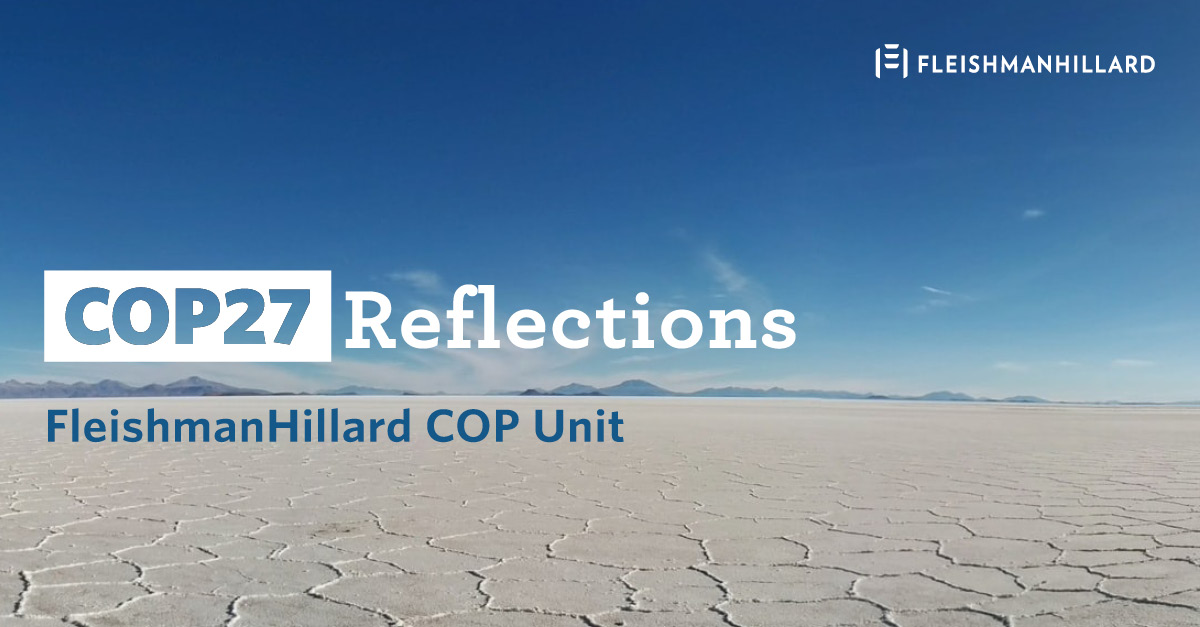FleishmanHillard COP27 Reflections: Finance that’s fit for the future

Imogen Sackey, Associate Director, Corporate Reputation & Purpose
On Sunday, Managing Director of Namibia’s Ministry of Environment and Tourism Petrus Muteyauli captured the spirit of COP27 powerfully:
“COP21 told us what to do, COP26 told us how to do it and COP27 calls us to go to the battlefield and implement what we decided over the past 27 years.”
In recent years, the world has heard repeatedly of pledges to tackle the climate challenge with financial support. But for all the goodwill of past promises, nations and businesses are yet to deliver on many of the critical commitments that vulnerable nations, in particular, are waiting for. Most notably, the promise made by wealthy nations in 2009 to deliver $100bn of climate finance to developing nations annually has not yet been reached once – 13 years later.
The question facing the ‘implementation COP’ today is simple: will it truly deliver the investment our climate so desperately needs?
As the world’s leaders take to the stage, we’ve identified two topics to watch for:
Addressing Loss and Damages
No meaningful discussion on climate finance can begin without paying due attention to loss and damages – the global financial process for compensating low-income regions and nations for climate-related impacts borne from emissions that, we all agree, they did not generate.
Yet, those hoping COP27 would drive greater investment will be cautious after the start of the summit itself was delayed amidst contentious discussions about its place on the agenda. Its formal addition on Sunday is no doubt a good thing.
As we watch today for action that will ensure wealthy nations meet past finance targets, it also opens the door for business intervention. And why would investors, financial institutions and other companies not want to seize the opportunity? In addition to disrupting the lives and homes of millions, loss and damages heavily impacts businesses in affected communities. Investing in mitigations that can protect people, products and assets may well impact their societal license to operate, in addition to their physical ability to do so.
The business community also has a crucial role to play in holding governments accountable for their promises, a role that will likely become of greater value in the years to come.
Finding Solutions in a Potential Recession
For many nations, the domestic economic picture does not look good. ‘Livelihood crises’ placed fifth on the World Economic Forum’s Global Risks this year as multiple countries face the toughest winter seen in recent history, with energy price and supply challenges, high inflation, and economic uncertainty.
And though capital will have to work much harder in the coming months and years to create real value, there are reasons for optimism. The reality of recession demands reinvention. In the context of both the climate and livelihood crises, it presents an opportunity for global economic systems to be built back more sustainably.
In this context, the UK’s commitment to triple investments in climate adaptation is much welcomed, and many will be watching to see if other nations follow.
Importantly, this also presents a communications opportunity for business. To deliver climate adaptation at scale, significant investment is required. Businesses should think carefully about aspects of their supply chain that are most vulnerable to climate change – whether that be agriculture, design, or production – and invest now in innovation and adaptation. Not only is this the morally ‘right’ thing to do, but it’s also smart business sense.
Clear, proactive communications about a business’ climate investment can both create advantages with investors, partners and suppliers who are all more focused than ever on keeping ahead of risk, and carry benefits with consumers, who are increasingly choosing businesses that can demonstrate a positive social and environmental impact.
Climate finance is no doubt in a state of repair; but therein lies the opportunity – for us to rebuild better. Today’s discussions will be a powerful indication of the appetite that exists across leadership to do so.
The FleishmanHillard COP Unit will continue to follow the COP27 Summit, stay tuned for more insights and commentary on these issues as the Summit continues.
Find Out More
-
Achieving Outsized Impact by Building Stronger Country Reputation
February 18, 2025


